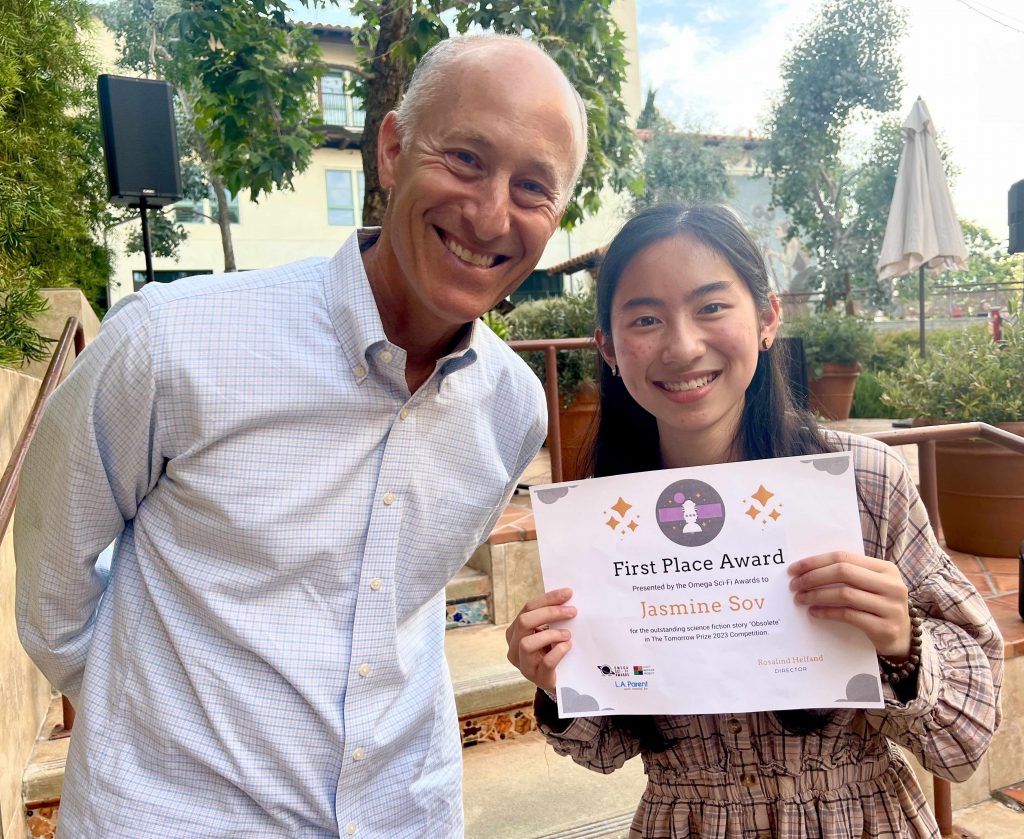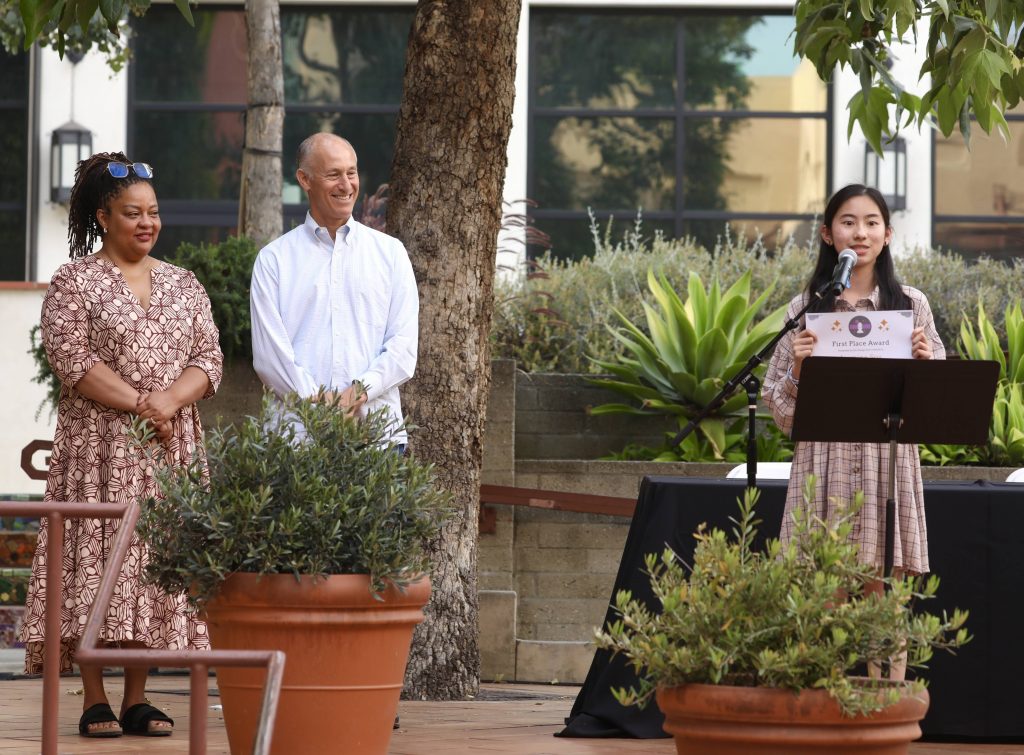As we worry about the increasing impact AI will have on our kids’ learning, I found myself absorbed in the short stories L.A. County high school students wrote for this year’s Omega Sci-Fi Awards writing competition, The Tomorrow Prize.

L.A. Parent co-sponsors this writing contest each year by presenting the first-prize award and publishing the recipient’s story (see below). I served as a finalist judge and was mesmerized by this year’s winning story, “Obsolete,” an engrossing narrative about the chilling role of technology on education — including a devastating result to one of our most beloved institutions: the public library. The author, Jasmine Sov, is a junior at Pasadena High School and calls herself a self-proclaimed library kid who grabs every opportunity to plug her local library databases. With her writing, she hopes to give back to the libraries that raised her and find her own place on the shelves one day.

The awards competition, presented by Sci-Fest L.A. and the Lightbringer Project, culminated with an awards ceremony in late spring at Vroman’s Bookstore with celebrities reading the finalists’ stories. L.A. Parent Publisher Ron Epstein and Nikki High, owner of Octavia’s Bookshelf, presented Sov with her award.
“Obsolete”
By Jasmine Sov
Dani flicks through her tablet as I gaze up at the roof of the Children’s Room. She says she likes to study here because it’s the prettiest place in the library, and I agree. Unlike most other buildings in this city, the library’s rafters are wooden and the stone facade is carved into Roman columns and swirling foliage. In the Children’s Room, painted vines and flowers wind around the rafters, and the fireplace mantle depicts children playing next to two grand ships. The table lamps cast a warm glow on the oak bookshelves.
It’s actually kind of infuriating that it’s this calm here. Dani’s right — again.
She looks up from her tablet and laughs a little. “I should have done this earlier. You’ve never been this quiet ever.”
“Only because you’re supposed to be quiet in a library,” I mutter, but it’s more than just that. I’m used to driving conversations, but sometimes I end up going overboard. To make me shut up, Dani dragged me off the HSR at her station instead of letting me stay on the train and go home. It worked — maybe too well. I don’t even feel obligated to talk. There’s no awkwardness…just a peaceful feeling between us.
I get up and wander around. The room seems to have a heartbeat, a quiet rhythm that my own heart has slowed to match. The monitors embedded in the old library desks hum softly. I tap one to start.
Search. Recommend…
Recommend.
Fiction. Sci-fi. Fantasy…
Fiction.
Historical. Realistic. Random…
Random.
A book cover loads on the monitor. Following the instructions on the screen, I copy a string of numbers on a slip of paper next to the monitor. Apparently, this is what I’m supposed to use to go find the book. I kneel down next to the bookshelves and start looking at every number until I realize there are actually decimal labels on the sides of the shelves.
So this was what Mrs. Polman, my English teacher, meant when she said our generation was losing critical brain mass.
Mrs. Polman also tells my class at least once a month how lucky we are to live in this modern age.
“In the earlier days of online tutoring,” she once told us, “real people were on the other side of the text box.”
“That was a whole job? Seriously?”
“Hey, what if the tutor got something wrong, too? Then wouldn’t the student, like, still not get it at all?”
“That’s a perfectly valid concern,” said Mrs. Polman. “Thankfully, some scientists recognized that and developed better AI systems in the testing labs, so now we talk to Sandy.”
“I like Sandy,” declared one student. “I got a calc worksheet done in 20 minutes after they helped me.”
“So true,” said another.
“And that’s why we’re all very lucky to be alive today. There are many jobs for you all in technology and science. When I was young it was already changing quickly, but now it’s going faster and faster. So, of course you want real people from the biggest industry in the world to be teaching the sciences.
“The only reason you’ve still got me and the English department here is because language can change. A few schools still have a math department, but we made the switch a while ago. Secondary school math is easily left to AI.”
“Oh yeah, Mr. Jeong is great,” agreed a kid in the front. “Hey, why do we need the history department here then? The past isn’t gonna change.”
“You didn’t hear?” A student turned around in his seat. “That bill got signed into law a few months ago already.”
“Exactly,” said Mrs. Polman. “But before you ask where the history teachers will go, it’s perfectly alright. Everyone’s gotten the credentials for computer science. They’ll have no trouble finding a job.”
“Must be looking forward to making six figures in STEM,” someone muttered.
Mrs. Polman didn’t acknowledge the remark. “Nonetheless, this will be great for you all as students. No more errors on tests, right? And you get the best teaching possible.”
“No more errors,” someone echoed.
I slide the book out, holding it carefully by the spine. “Anne of Green Gables.” I think that was on some classics reading list I saw a while back. It linked to an online copy, so I could just read it there. Why have a physical, damageable copy when you can just pull it up on your phone?
I open the book to a random page.
“Dear old world,” she murmured, “you are very lovely, and I am glad to be alive in you.”
“It is lovely,” I say.
“What’s lovely?” says Dani.
“Ah, nothing.”
“What, not me?”
“Alright, you’re a lovely human being.”
“Thank you.”
That sentence is really lovely though, especially in this atmosphere. I could spend a whole day sinking into one of those squashy armchairs in the corner by the window, learning more about Anne’s story. And, when I have to rest my eyes, I could watch the corn sway in the greenhouses next door.
“Hey, Dani.”
“Hmm?” She looks up from her tablet.
“Sorry. You mind if I walk around a bit?”
“Oh, yeah, no problem.” She turns back to her tablet, and I walk away.
The main hall’s hanging metal lamps have a nice vintage charm. The few patrons here sit scattered around the many tables and some of them tap away on some older computer models. I’m surprised they still work, given that the browser interface looks like something my mom might have used when she was a kid. Why would someone willingly subject themselves to that?
An answer surfaces: Maybe these people don’t have the internet at home.
At my school, they have this program to lend a laptop to every student for the school year. In sophomore year, my history class was assigned a big research project. “Start doing your research today so you won’t have to crunch later,” our teacher said.
Unfortunately, that was when the internet went out for the first time at Ada Lovelace High School.
There’s one part of the blackout that I remember distinctly (other than the guy in front of me breathing into a freezer-size Ziploc bag and the teacher yelling at everyone to stay calm). It’s what the girl on my left said to herself: “I don’t even have internet at home and my brothers are quieter than this.”
Can’t believe I didn’t think of that earlier. That also explains why all those old books still have physical copies here. I start running to the Children’s Room, notice a sign that says NO RUNNING, and speed-walk to the Children’s Room instead.
“Dani Dani Dani Dani,” I shout. But then I think, Liz you are ruining the peace, and lower my voice to a whisper.
Dani pauses her music. “Man, I really thought it was working.” She chuckles and scoots over.
“What’s up?”
I sit down. “Do they have research stuff here? You’ve been coming here for a while, you would know.”
“Like books? That’s in another room on the other end of the hall.”
“Alright, well…” I eye the entrance. “I don’t want to disturb the people in the hall again, so tell me what it’s like.”
“…It’s a room with a bunch of shelves and a bunch of books.”
“What kind of books?”
“Like encyclopedias and history books, and I think there was a book about science project ideas.”
“That’s awesome…”
“I think it’s all online, too, so you can look it up when you get home.”
“I can just come with you again next week.”
“No, no — it’s gonna be closed next week.”
I look at her.
“What?”
“Yeah. Says so on the site. The city just hasn’t put up the signs yet.”
No way.
“How could a place like this be closed?” I stand up. “Are you kidding? How—”
She shrugs. “You didn’t hear the news? California’s implementing that bill that passed a few years ago. They’re demolishing the libraries to make space for tech offices and labs. This is the last one.”
The following week, I wave my phone over the scanner at the HSR station. The guardrail lifts just as the train pulls into the station. Ads run on the side of the escalator as I run past, backpack bouncing against my shoulder blades.
It can’t be closed.
I hold onto the pole in the center of the train car as the scenery blurs outside the window. When the doors open at the next stop, I sprint, running through the terminal and onto the sidewalk.
I look across the street, hoping, praying. But where I should be seeing the library, I see clouds moving across a hazy sky. I see a fence and caution tape slashing neon stripes through the wires.
In the midst of a pile of rubble, I see an image carved in stone: Children playing next to two grand ships.






















